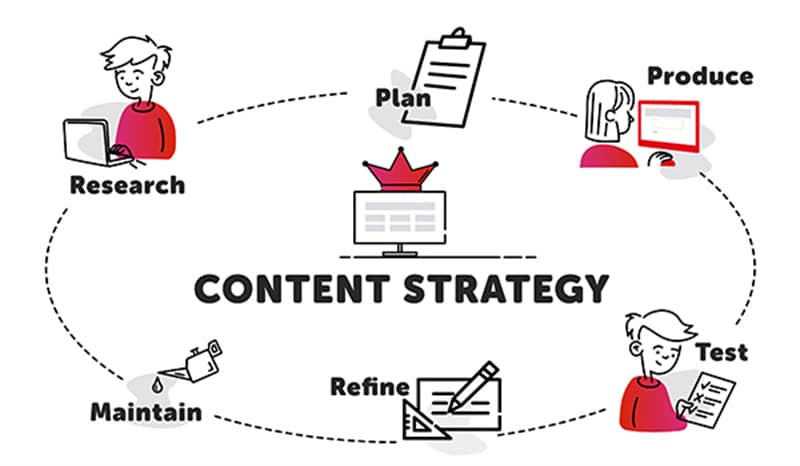
Real estate marketing is an ever-changing industry, and it is essential for real estate agents to stay up to date with the latest trends.
A content strategy is an essential tool for creating an effective marketing plan. This article will explain what a content strategy is, the benefits of developing one, and how to create a successful content strategy for real estate marketing.
Definition of a Content Strategy

A content strategy is a plan for creating, publishing, and managing content to reach a specific goal. Content can include blog posts, videos, infographics, and social media posts. Content strategies are used to increase brand awareness, generate leads, and engage with customers.
Benefits of Developing a Content Strategy
Content strategies provide several benefits to real estate agents. A content strategy can help agents reach more potential customers, build relationships with clients, and increase conversions. Content strategies also help agents differentiate themselves from their competitors and increase their visibility in search engine results.
Understanding the Real Estate Market
Before developing a content strategy, it is important to understand the real estate market. Agents should identify their target audience, research their competitors, and determine the types of content that will be most effective for their business.
Identifying Target Audience
The first step in developing a content strategy is to identify the target audience. Agents should consider the demographics, interests, and goals of their target audience when creating content. Agents should also consider their target audience’s buying cycle, which will help them determine the types of content that will be most effective.
Researching Competitors
The next step is to research the competition. Agents should identify their competitors and research their content strategies. Agents should pay attention to the types of content their competitors are creating, the frequency of their content, and the levels of engagement they are receiving. This will help agents create a content strategy that is unique and effective.
Developing Content
Once the target audience and competition have been identified, agents can begin developing content. Agents should identify the types of content they will create, create a content calendar, and write the content.
Identifying Content Types
The first step in developing content is to identify the types of content that will be created. Content types can include blog posts, videos, infographics, podcasts, and social media posts. Agents should consider creating content for different stages in the buying cycle, such as awareness, consideration, and decision-making.
Agents should also consider using content marketing techniques such as SEO, keyword research, and link building to increase visibility in search engine results.
Creating a Content Calendar

Once the types of content have been identified, agents should create a content calendar. A content calendar will help agents stay organized and ensure content is published on a regular basis. Agents should set goals for each piece of content, such as increasing website traffic or generating leads.
They should also decide on the frequency of content, such as daily, weekly, or monthly, and plan out the topics for each piece of content. Agents should also consider the time of day they will post content and the platforms they will use. Finally, agents should create a system for tracking the success of each piece of content.
Writing Content
Once the types of content have been identified, agents should begin writing the content. Agents should consider the writing style, tone, and length of each piece of content. Agents should also use keywords and phrases that will help their content rank higher in search engine results.
To ensure that the content is engaging and informative, agents should research relevant topics and use facts and statistics to support their arguments. Agents should also use visuals, such as images and videos, to make the content more appealing. Additionally, agents should check out Academichelp for helpful tips on writing effective content.
Promoting Content
Once the content has been created, agents should promote it to reach their target audience. Agents can promote content using social media, email marketing, and paid advertising.
Utilizing Social Media
Social media is an effective way to reach potential customers. Agents should identify the social media platforms their target audience uses and create content specifically for those platforms. Content for social media should be engaging, informative, and entertaining.
Agents should also use relevant hashtags and engage with followers to increase visibility. Additionally, agents should use analytics to track the success of their social media content and adjust their strategy accordingly.
Utilizing Email Marketing
Email marketing is another effective way to reach potential customers. Agents should create email lists and write engaging subject lines and compelling copy. Agents should also consider using automation to send emails at specific times and track the success of their emails.
Utilizing Paid Advertising
Paid advertising is a great way to reach potential customers. Agents should choose the platforms they will use, set budgets, and measure the return on investment (ROI).
Analyzing Results

The final step in creating a content strategy is to analyze the results. Agents should track metrics such as website traffic, social media engagement, and conversion rates. Agents should also evaluate the strengths and weaknesses of their content and refine their content strategy accordingly.
Conclusion
A content strategy is an essential tool for real estate marketing. Content strategies can help agents reach more potential customers, build relationships with clients, and increase conversions. Agents should identify their target audience, research their competitors, and create content that is unique and engaging.
Agents should also promote their content using social media, email marketing, and paid advertising. Finally, agents should track the success of their content and refine their content strategy as needed.










